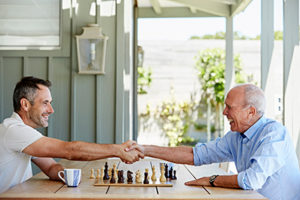Connect2Affect offers helpful resources and activities to help older adults strengthen their ties to family and friends.
“A good friend will come and bail you out of jail, but a best friend will be sitting next to you saying, ‘Damn, that was fun!’”
Who hasn’t seen that saying in a Facebook post and chuckled to themselves?
While you could argue that a truly good friend would have talked you out of doing something that lands you in jail in the first place, the sentiment is clear: friendships are fun.
“There are three kinds of friends that everyone needs in their life: Someone to talk to, someone to depend on, and someone to have fun with”
Shared experiences with friends are also vital to our mental and physical well-being. Emotional support matters — especially as we age. Not only can having a rich social life help you live longer, but having friends can also increase your sense of purpose and belonging, reduce your stress level, and help you cope with trauma.
As you grow older, though, it might seem harder to make new friends or even maintain your existing friendships. You may be feeling lonely. Maybe now that your kids have left the nest, you find you have less in common with the friends you made when your children were young.
Maybe the friends you used to see regularly have moved away. Or you’ve retired and don’t have as much to share with your old coworkers now that you’re in a different phase of your life. Maybe a friend you counted on has passed away.
While it’s natural for people to grow apart over time, there are plenty of things you can do to breathe new life into old friendships. You can even develop new relationships that can blossom into meaningful friendships. It’s never too late!
Here are some tips that can help you recommit to making friendships a central part of your life again.
 Broaden your mindset.
Broaden your mindset.
Did you make friends easily as a kid? Chances are, if you both liked to play kickball at recess or ride bikes after school, you had yourself a friend.
Common interests aside, the key to making friends back then was the same as it is today: you didn’t think too hard about it. Even if you’ve had friendships fizzle in the past, try to approach making friends today with the same openness you had in your youth.
It can also help to think outside the box when looking for opportunities to make friends. Though most of us have friends around the same age because we met at school or while raising young children, there’s no reason to limit yourself. Intergenerational relationships offer rewards for everyone.
“There’s a beautiful reciprocity in these relationships,” Irene S. Levine, author and creator of The Friendship Blog told Experience Life. “Friendships with older folks help us see our own future and learn ways to enjoy the years that lie ahead. Younger people tend to have more energy, a sense of adventure and a greater willingness to try new things. Each friend can offer the other something different based on their station in life.”
Know what you want from a friend.
“There are three kinds of friends that everyone needs in their life: Someone to talk to, someone to depend on, and someone to have fun with,” William Rawlins, the Stocker Professor of Interpersonal Communication at Ohio University and author of The Compass of Friendship told Time magazine. “In my profession, I talk to a lot of people, quite deeply, about their friendships. What struck me is that, no matter how old someone is, our expectations for our friends remain the same.”
Think about the kinds of friends you’d like to have in your life. People with the same interests are wonderful because they can fuel your passions. A gardening club, book group or sewing circle are ideal for forging these kinds of friendships.
And while your book club buddies may be easy to talk to and fun to be around, remember the third kind of friend Rawlins recommends: someone to depend on. Good friends are people you can lean on when times are tough.
When you notice an acquaintance is dependable, kind and a good listener, take note. This may be someone worth engaging in a deeper friendship.
 Put a plan in action.
Put a plan in action.
Making friends a priority may take longer than it did when you were younger. But you’ve also had enough life experience to know that the effort is absolutely worth it. Here are some simple ideas for getting started:
- Check to see if your local senior center or library is hosting virtual activities or virtual meet-ups where you can safely connect with new people.
- Do something nice for yourself every day — you’ll feel more open to connecting with others when you do.
- Reach out to an old friend or family member you haven’t spoken with for a while.
- Take advantage of our volunteer opportunities as a way to engage with your local community.
For more ways to connect, search our Local Assistance Directory to find social activities, support groups and volunteer opportunities, plus transportation options for older adults in your area. These services are free or offered at a reduced cost, too!

